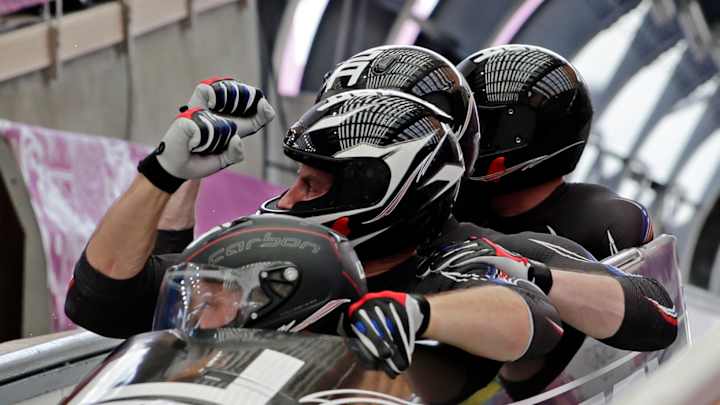Zubkov wins double bobsled gold for Russia; U.S. takes 4-man bronze

KRASNAYA POLYANA, Russia (AP) Alexander Zubkov was given a daunting assignment for his home Olympics. His task: Take to Russian ice and make history, against drivers who have been beating him for years.
Do svidaniya, world!
Zubkov was uncatchable.
He drove Russia to victory in the four-man bobsled race Sunday, adding that gold to his two-man from earlier in the Sochi Games and making him the sixth pilot to sweep those events at an Olympics. Until now, no one had ever achieved that feat on home ice, but this track was built for Zubkov and he proved to be its master.
''We did the impossible,'' Zubkov said.
He made it look easy. Against the world's best like Latvia's Oskars Melbardis and American recordsetter Steven Holcomb.
Melbardis of Latvia drove to the silver medal, matching his nation's best showing in a Winter Olympic event. And Holcomb, the 2010 four-man champion from Park City, Utah, piloted USA-1 to bronze, ceding his Olympic title but winning his third career medal - tying the most by any U.S. bobsledder - and giving his nation seven sliding medals at the Sochi Games, tops among all countries.
''We came here to win a medal and we did just that,'' Holcomb said. ''It was a tough race. It wasn't easy. We kind of knew Zubkov was going to be fast and really hard to beat and the Latvians had a great day today and pulled away, but to come away with a bronze medal, we're pretty happy with it. It was a tight race and we're pretty satisfied.''
Zubkov had a slim lead entering Sunday's final two runs and predicted the title would be decided in the third heat.
Naturally, he was right. That's where he got all the cushion he needed.
Zubkov, with push athletes Alexey Negodaylo, Dmitry Trunenkov, Alexey Voevoda in his sled, took one look at the standings after the leaders finished their third runs, clenched a fist and punched the air.
He knew it was over.
''It means a great deal to be able to win in Russia,'' Zubkov said.
A 39-year-old driver who hadn't won a single two- or four-man race all season on the World Cup circuit was perfect in Sochi. Zubkov wound up 0.09 seconds faster than Melbardis, who was 0.30 seconds up on Holcomb.
''I talked to Zubkov a couple years ago and asked him the first day he slid, and he told me he was 6 years old,'' said U.S. bobsledder Justin Olsen, a push athlete in the USA-2 sled piloted by Nick Cunningham that finished 12th. ''So he's been sliding for 33 years. Holcomb's been sliding since 2001.''
Melbardis came on strong this season, and Latvian sliding looks like it's positioned to be a power for years to come.
Just not gold-medal good. Yet.
''I think he was just better,'' Melbardis said of Zubkov. ''That's it.''
Hey, no one else was better than Melbardis. He had plenty to celebrate.
In turn, so did Holcomb, who got his gold at Vancouver four years ago to end a 62-year drought for the U.S. in that race. He also won two-man bronze in Sochi, ending a 62-year medal drought for the Americans in that discipline. So now, he became the first American pilot to win medals in both Olympic races in ... yep, 62 years.
''These guys had a tremendous second push and kept us in there,'' Holcomb said, referring to his team, which was racing together for the last time.
Holcomb was joined in the sled by Curt Tomasevicz of Shelby, Neb., Steve Langton of Melrose, Mass., and Chris Fogt of Alpine, Utah. For Tomasevicz and Langton, it was their second Olympic medals. Fogt won his first.
Afterward, Tomasevicz said what many expected him to say: He's retiring, and thought this was the perfect way to go out.
''This was it for me,'' said Tomasevicz, a gold medalist four years ago. ''I can't imagine walking out on a better note, even a gold medal four years from now. The way we fought for the last four years, the way the competition got better for the last four years, crossing that finish line was maybe the greatest moment I've felt in a bobsled. It's pretty epic.''
The bronze didn't come easily, with only 0.03 seconds separating third from fourth. But when the Americans crossed the line, a medal clinched, a big celebration began.
Ever since winning the gold in Vancouver, Holcomb has fought the notion that he's only good on North American tracks.
His bronze in Russia not only disproved that theory, again, but also ensured that Germany - perennially the world's top sliding nation - would be shut out of the medals in four-man for the first time since 1968. Germany was dominant in winning five medals in luge to lead off the Sochi Games, then left skeleton and bobsled empty-handed.
''We wanted gold,'' Holcomb said. ''But we're not complaining about bronze.''
